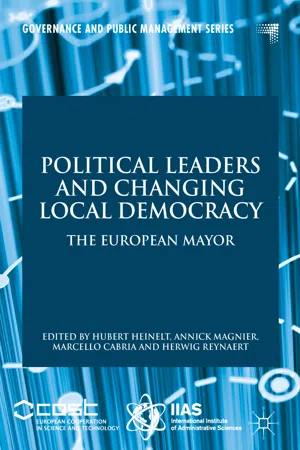Political leadership at the local level has gained more and more interest in the scholarly and political debate during the last 20 years. Political leadership has been seen as necessary to overcome a highlighted democratic deficit by increasing accountability of core policy makers involved not only in policy making in the city hall but also in administrative reforms or in governance arrangements in which different societal actors play a crucial role.1 These debates about the importance of political leadership at the local level have had, for instance, a clear impact on the introduction of directly elected mayors in a number of European countries.
The book aims to make a contribution to these debates by referring to a survey on mayors of cities with more than 10,000 inhabitants in 29 European countries carried out from the end of 2014 to the end of 2016. These countries were Austria, Belgium, Croatia, Cyprus, the Czech Republic, Denmark, England (that means, not the whole UK), Finland, France, Germany, Greece, Hungary, Iceland, Israel, Italy, Latvia, Lithuania, the Netherlands, Norway, Poland, Portugal, Romania, Serbia, Slovakia, Slovenia, Spain, Sweden, Switzerland and Turkey.
2 This research constitutes the extended reissue of a previous work, conducted about ten years ago on a more limited number of countries. That survey was based on a questionnaire similar to the current one. This is why the recent survey has been conceived not only in order to trace an updated picture of the present, but also to carry out a comparison with the results of the first survey. Therefore, the following (interrelated) research questions are addressed in the book in a comparative way between countries (or country groups) as well as over time:
How did they become a mayor, what is their social background and how has their political career evolved?
What are their role perceptions?
What is the political agenda of mayors?
How do mayors interact with other actors in the city hall as well as with societal actors and actors from upper levels of government?
What is their notion of democracy, are there differences and how to explain them?
What are their attitudes towards recent administrative and territorial reforms?
Do party politics (or party politicization at the municipal level) play a role?
The survey was launched by a network of scholars (POLLEADER network) mainly organized in the standing group on Local Government and Politics (LOGOPOL) of the European Consortium for Political Research (ECPR) or in the European Urban Research Association (EURA) and in partnership with the COST project ‘Local Public Sector Reforms- an International Comparison (LocRef)’.
The scholars of the POLLEADER network have carried out a number of surveys during the last 20 years.3 The first survey referred to municipal executive officers (CEOs) or the highest-ranking appointed and non-elected civil servant or employee at the municipal level.4 As the research was supported by UDITE (Union des dirigeants territoriaux de l’Europe), it was called the UDITE survey.5 The next survey was the aforementioned one which dealt with European mayors from municipalities with more than 10,000 inhabitants.6 It followed a survey on councillors from municipalities with more than 10,000 inhabitants—called the MAELG (‘Municipal Assemblies in European Local Governance’) survey. It was based on a stratified sample that took into account the regional distribution of the total number of municipal councillors in a country.7 The next survey concerned the second tier of local government—or more precisely councillors as well as executive heads (like prefects) and t...
